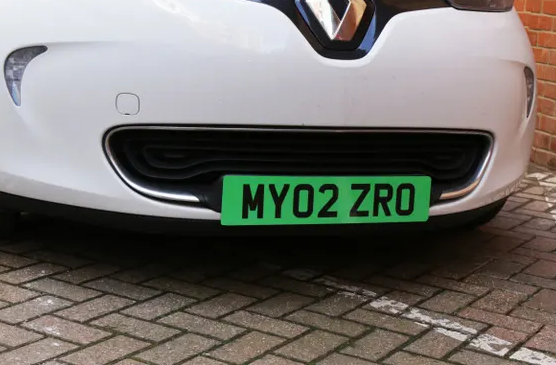The UK government announced Tuesday that it has launched a consultation that may see green licence plates on zero-emissions vehicles by the end of 2021.
Three proposed designs have been put forward, including a green plate with black lettering, a green dot or another green symbol on the current type of number plate and a green flash. However, the public will be asked to choose, which one it wants.
The government is also in discussions to decide and what kind of low emissions vehicles should qualify; whether the green plates should cover battery-electric, hydrogen fuel cell and plug-in hybrid vehicles.
The Transport Secretary Grant Shapps, writing in the Telegraph, said the idea was that the green number plates will make the cars more popular and desirable.
“Fully green number plates would allow people from all over the UK to spot vehicles based on their environmental impact. This government is making it more convenient than ever before for drivers to switch to a clean, zero-emission car. We want these cars to become the new normal – and to be as easy to charge as a smartphone,” said Shapps.
Other issues being discussed before their introduction, is if the new plates will only be available for newly registered vehicles or if drivers will be able to apply for them on vehicles they already own and if the green licence plates should be compulsory for cars that qualify as zero-emission.
Special Perks for Green Plated Cars
Another area under discussion as part of the plans is if the zero-emission vehicles with a green plate will be able to use bus lanes or have special parking places in the city. Nottingham City Council already runs such a scheme and according to Shapps other cities are being encouraged to follow.
“Several local authorities have already indicated plates with a green element would enable clearer visual recognition of vehicles eligible for local incentives, such as access to bus lanes, ultra-low or zero-emission zones, and cheaper parking,” he continued.
However, not everyone is as enthused with the idea as Mr. Shapps and Nicholas Lyes, head of motoring policy at the RAC, was more cautious.
“While the sentiment seems right, there are question marks as to whether drivers would see this as a badge of honour or alternatively it could foster resentment among existing drivers of petrol and diesel vehicles,” he said in a statement.
Meanwhile, the figures speak for themselves. While the number of people who are buying electric cars has been growing steadily it is still way behind the number of new petrol and diesel cars that are bought.
Data from the Society of Motor Manufacturers and Traders showed that in September 2019 there were 7,704 battery electric vehicles, 5,179 plug-in hybrid vehicles and 16,932 hybrid electric vehicles registered in Britain. That compares to 77,510 diesel cars and 224,828 petrol-powered ones – by far the most.
Friends of the Earth said that rather than introducing green number plates, the government needed to go further to help people move to cleaner vehicles by offering financial incentives and introducing more charging points, which in some rural areas are virtually non-existent.
“A national scrappage scheme is urgently needed too, to help fund a switch to a cleaner vehicle or greener transport alternative — such as car club membership, a rail season ticket or even an e-bike loan,” Jenny Bates, a campaigner for the group, said in a statement.
The last time Britain changed its number plates was in 1973 when rear registration numbers were changed from black and white to yellow.
Photo from the Guardian
- Why is California So at Risk from Wildfires? - 13th November 2019
- Carbon Offsetting is Growing but Does it Make a Difference? - 11th November 2019
- Three Confirmed Dead as Australia Prepares for “Catastrophic” Bushfires - 11th November 2019






